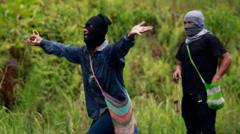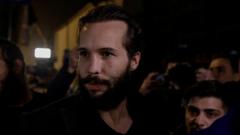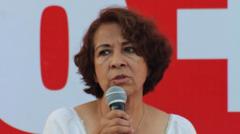**Brazilian Authorities Prevent Bomb Plot at Lady Gaga's Rio Concert**

**Brazilian Authorities Prevent Bomb Plot at Lady Gaga's Rio Concert**
Brazilian police successfully disrupted a planned bombing at Lady Gaga's concert, where over two million gathered. The suspects aimed for notoriety through social media.
Brazilian police have thwarted a bomb attack aimed at Lady Gaga's concert in Rio de Janeiro, where a crowd of over two million gathered. The planned attack was orchestrated by suspects with extremist tendencies and was intended to gain social media attention. Authorities arrested key figures, emphasizing a major security effort to protect attendees.
Brazilian police revealed that they thwarted a significant bomb attack that was intended for Lady Gaga's concert, held on Copacabana beach in Rio de Janeiro on Saturday. The Civil Police of Rio de Janeiro, in collaboration with the country's ministry of justice, reported that the suspects had mobilized individuals to carry out attacks using improvised explosives, targeting the concert to gain notoriety on social media platforms.
Authorities arrested the alleged mastermind behind the plan and a teenager involved in the plot, with their communications on social media emphasizing hate speech against vulnerable groups, including children, adolescents, and the LGBTQIA+ community. The mastermind was apprehended for illegal firearm possession in Rio Grande do Sul, while the teenager faced charges for storing child pornography in Rio.
Further investigations revealed that the suspects had been promoting radical ideologies among youth, advocating self-harm, and disseminating violent content as a means of identity and challenge. They had identified themselves as fans of Lady Gaga, widely known as "Little Monsters".
In response to this alarming situation, police executed search warrants across several Brazilian states, including Rio de Janeiro, Mato Grosso, Rio Grande do Sul, and Sao Paulo, confiscating electronic devices and various materials. Dubbed "Operation Fake Monster," this initiative commenced following intelligence reports indicating that online groups were inciting violence among adolescents with coded language and extremist symbols.
The concert, free to the public and sponsored by the city to invigorate Rio's economy, drew an estimated attendance of over two million, with projections indicating a significant economic impact of around $100 million (£75 million). To ensure safety, about 5,000 officers were deployed, and attendees were subjected to rigorous security checks, including metal detectors, drones, and facial recognition technology.
Brazilian police revealed that they thwarted a significant bomb attack that was intended for Lady Gaga's concert, held on Copacabana beach in Rio de Janeiro on Saturday. The Civil Police of Rio de Janeiro, in collaboration with the country's ministry of justice, reported that the suspects had mobilized individuals to carry out attacks using improvised explosives, targeting the concert to gain notoriety on social media platforms.
Authorities arrested the alleged mastermind behind the plan and a teenager involved in the plot, with their communications on social media emphasizing hate speech against vulnerable groups, including children, adolescents, and the LGBTQIA+ community. The mastermind was apprehended for illegal firearm possession in Rio Grande do Sul, while the teenager faced charges for storing child pornography in Rio.
Further investigations revealed that the suspects had been promoting radical ideologies among youth, advocating self-harm, and disseminating violent content as a means of identity and challenge. They had identified themselves as fans of Lady Gaga, widely known as "Little Monsters".
In response to this alarming situation, police executed search warrants across several Brazilian states, including Rio de Janeiro, Mato Grosso, Rio Grande do Sul, and Sao Paulo, confiscating electronic devices and various materials. Dubbed "Operation Fake Monster," this initiative commenced following intelligence reports indicating that online groups were inciting violence among adolescents with coded language and extremist symbols.
The concert, free to the public and sponsored by the city to invigorate Rio's economy, drew an estimated attendance of over two million, with projections indicating a significant economic impact of around $100 million (£75 million). To ensure safety, about 5,000 officers were deployed, and attendees were subjected to rigorous security checks, including metal detectors, drones, and facial recognition technology.























